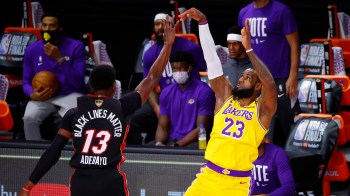The revenue rise of the MLB
TEXT OF INTERVIEW
Scott Jagow: Baseball hasn’t been the national pasttime for a long time. At least in terms of revenues. In recent years, the NFL has dominated the Major Leagues economically. But we just learned that baseball finished the season with just over $6 billion in revenue. And that puts it about dead even with football.
Let’s bring in our business of sports commentator, Diana Nyad. I find that pretty surprising. What’s baseball doing right?
Diana Nyad: It is totally surprising. In the last four years, the
NFL has grown by about 25 percent a year, which sounds right. Baseball’s grown by 50 percent a year.
Jagow: Wow — revenues.
Nyad: Revenues. And attendance at an all-time high. One of the reasons is that they’re starting to build these, you know, urban ballparks — St. Louis and San Diego are great examples. You know, there are these beautiful retail stores. You go out for the experience, not just the ball game itself. And now New York — both the Mets and the Yankees — in a couple of years are gonna have brand-new parks. Same thing, I mean the Yankees’ gonna bring in about $100 million in luxury suites and things like that. And what’s happened is that that kind of money by the big teams, you know, was forced a few years ago into revenue sharing. And that’s why this year, we’ve seen the intent of that revenue sharing come to life. Just as a . . . you know, I’m not a huge baseball follower, but it was great for me, and I think a lot of people, to see the Diamondbacks, the Cleveland Indians and the Colorado Rockies instead of the perennial big-money teams. So like, the whole country now has some reason to hope that their Pittsburgh Pirates, their Baltimore Orioles, their Seattle Mariners, might make it up to the big show.
Jagow: Well obviously, baseball’s economic health is pretty good right now. Are the managers going to see any of it? Because we hear about Joe Torre signing a big contract with the Dodgers, but I understand that the salaries for other baseball managers are quite low compared to other sports.
Nyad: You’re right. I was actually shocked, I had no idea — half of the managers out there make less than $1 million a year. Now, we might say, “Well, that’s a lot of money. Good, that’s what they should be making, not these $10 million a year, give me a break.” But the truth is, the baseball managers, they work like dogs. I mean, from the day the season ends, they’re over in Japan recruiting, they’re getting ready to bid for those free agents, which’ll start next Tuesday. And you know, Ozzy Guillen of the White Sox says, “We are grossly underpaid.” I think a huge reason is the college game. There’s no Major League manager who’s looking to say, “Eh, I think I might go manage Arizona State next year.” There’s no crossover at all with the college game, so there’s not a marketplace at all. So the supply and demand all of a sudden is there’s lots of supply and very little demand.
Jagow: All right, Diana, thanks for joining us.
Nyad: Thank you, Scott.
Jagow: Diana Nyad, our business of sports commentator.
There’s a lot happening in the world. Through it all, Marketplace is here for you.
You rely on Marketplace to break down the world’s events and tell you how it affects you in a fact-based, approachable way. We rely on your financial support to keep making that possible.
Your donation today powers the independent journalism that you rely on. For just $5/month, you can help sustain Marketplace so we can keep reporting on the things that matter to you.


















